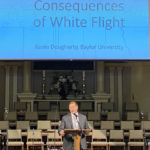WACO—The “normalization of white supremacy” has “distorted the very fabric of Christianity,” Black theologian Anthony Reddie told an international online audience and a group assembled at Baylor University’s Truett Theological Seminary.
White supremacy is normalized by “the failure to call into account” attitudes of “superiority, entitlement and privilege,” said Reddie, director of the Oxford Centre for Religion and Culture and the first professor of Black theology in the history of Regent’s Park College at the University of Oxford.
He delivered the keynote address Feb. 15 on the first day of a conference on Racism in the World Church. The event is sponsored by Truett Seminary, with financial support provided by the Eula Mae and John Baugh Family Foundation and others.
‘Pilate represents white supemacy’
Reddie pointed to the story of Jesus and Pontius Pilate as recorded in John 18:28-40 as a picture of how marginalized and oppressed people are treated by colonizers who wield political power.
In the 21st century context, he said, “Pilate represents white supremacy.” Pilate’s primary interest was holding onto the power he possessed. He saw colonized Jews as inherently “inferior.” And he considered their lives expendable if they presented a threat to the empire.
“The cross was an instrument of state-sponsored terrorism” carried out against people whom those in power considered a threat, he said.
Reddie pointed to Black liberation theologian James Cone’s linking of the cross and the lynching tree.
“To hold power and to subjugate the marginalized and the oppressed, you need lots of Pontius Pilates,” he said.
“What we need is anti-racism, where we are implacably against Pontius Pilate. We are implacably against the forces of power and self-interest. We are implacably on the side of those who are marginalized and oppressed.”
Sign up for our weekly edition and get all our headlines in your inbox on Thursdays
‘Populism always needs a scapegoat’
In a conversation with Torie Johnson, associate vice president at Baylor, Reddie expanded on some of the themes he mentioned in his keynote address.
He noted the link between the power of empire—as represented by Pilate—and those who appeal to populism—as exemplified by the crowds that called for Jesus to be crucified.
Reddie pointed to politicians in the United Kingdom who exploit poor, disenfranchised whites by demonizing immigrants. They appeal to “a politics of nostalgia” by painting an idealized picture of “an imaginary past that never existed,” he said.
“Populism always needs a scapegoat. It always needs someone you can blame,” he said.
Reddie closed by offering a vision of hope for the global church, if it is willing to surrender privilege, deny self and stand with the oppressed and marginalized.
“There is always the possibility of working together and doing things better,” he said. “I am always infused with hope. What keeps me hopeful is because God is God, and because Christian hope doesn’t negate struggle. Change happens through struggle.”
















We seek to connect God’s story and God’s people around the world. To learn more about God’s story, click here.
Send comments and feedback to Eric Black, our editor. For comments to be published, please specify “letter to the editor.” Maximum length for publication is 300 words.